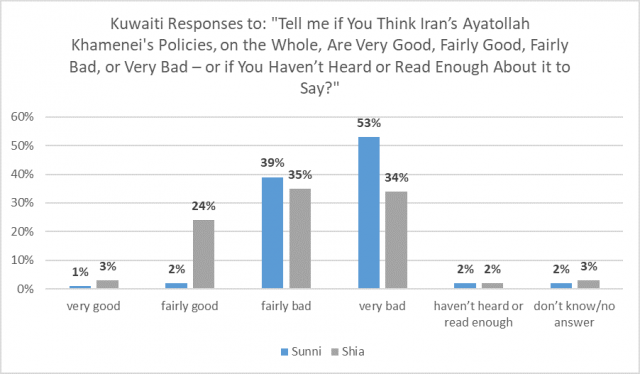
- Policy Analysis
- Fikra Forum
Kuwaiti Public, Including Shia Minority, Still Anti-Iran—but Wary of Conflict

As tensions between the United States and Iran escalate, oil-rich Kuwait, sandwiched between Iran and Iraq at the mouth of the Gulf, is a key U.S. partner right in the potential line of fire. It is also the most internally politically active country of all six GCC Arab monarchies, with real contested parliamentary elections, including a Shia minority of about one-third its 1.5 million citizens. In fact, the ruling Emir recently appointed a new prime minister, partly in response to popular pressure for change. For these reasons, trends in Kuwaiti public opinion should be of considerable interest to American foreign policy calculations.
In this context, a rare Kuwaiti opinion poll completed just one month ago offers timely insights into that country’s current political climate. The survey data demonstrate that the Kuwaiti public, like its government, remains both very leery of Iran, and more pro-American than any other Arab public. At the same time, however, most Kuwaitis want their country to “stay out of any wars.”
More specifically, the overwhelming majority (85%) of Kuwaitis now voice a negative view of Iran’s Ayatollah Khamenei. Nearly as many (80%) say it is not important for their country to have good relations with Iran. And a similarly high proportion (81%) express an unfavorable opinion about Iran’s Shia regional ally, Hezbollah. These solidly negative attitudes are statistically unchanged in annual polls over the past three years.
And significantly, Kuwait’s large Shia minority generally shares its Sunni compatriots’ negative opinions of both Khamenei and Hezbollah, albeit with somewhat less intensity. Sixty-nine percent of Shia, compared with 92% of Sunnis, have at least a “fairly bad” view of Khamenei’s policies. Around 90% of both sects also voice a negative opinion of Hezbollah. But among Shia, just 45% express a “very negative” view, compared with 74% of Sunnis holding that strongly negative opinion. These percentages, too, have hardly moved since 2017.
The clearest sectarian difference, however, is on the question of good relations with Iran. A mere 4% of Kuwaiti Sunnis say such relations are even “somewhat important.” But among Shia, that number jumps to 45%. Evidently, even though two-thirds of Shia disapprove of Iran’s leader, nearly half are concerned to maintain good ties with that neighboring country.
By comparison, half the overall Kuwaiti public say that good relations with the United States—which liberated Kuwait from Saddam Hussein’s occupation in the 1991 Gulf War—remain important for their country. This a significantly higher percentage than in any other Arab society polled recently, and is down only marginally in the past three years. Moreover, asked what in particular they would most like the United States to do in the region, a plurality of Kuwaitis—32%, up ten points since 2018—now pick “increase its practical opposition to Iran’s influence and activities.”
Nevertheless, despite the Kuwaiti public’s “tilt” toward the United States and against Iran, the majority would prefer not to get embroiled in any direct confrontation between the two. Two-thirds of Kuwaitis agree with this statement: “Right now, internal political and economic reform is more important for our country than any foreign policy issue—so we should stay out of any wars outside our borders.” That proportion is now up ten points, compared to a very similar question asked in 2017.
How much internal political or economic reform, then, do Kuwaitis really want from their government? The answers are mixed, but have remained relatively unchanged over the past three years—with one interesting exception. About one-fifth of the Kuwaiti public, as in the recent past, now say their government is doing “too little” in each of the following three areas: promoting opportunity and equality for women, dealing with economic problems and daily hardships, or sharing the burden of taxes and other obligations in a fair manner.
The interesting exception to this stable picture, reflecting surprisingly well on Kuwait’s government, is the sharp decline in the percentage who say it is doing too little to “reduce the level of corruption in our political and economic life.” As recently as late 2018, that unfavorable figure stood at 60%. In the November 2019 survey, by contrast, the proportion seeing too little government action against corruption dropped by half, to just 31%. Apparently, a crackdown on some high-profile cases has had a noticeable effect on popular perceptions.
Concerning religious reform, however, the Kuwaiti public remains more divided. Thirty-nine percent, about the same as in the past three years, agree at least somewhat with this controversial proposition: “We should listen to those among us who are trying to interpret Islam in a more moderate, tolerant, and modern direction.” That is among the highest such proportion among any Arab publics polled. On the other hand, about one-fourth of Kuwaitis—approximately the same percentage as in Egypt, Jordan, Saudi Arabia, Lebanon, or the UAE—continue to express at least a somewhat positive view of the fundamentalist Muslim Brotherhood.
On one related set of issues at the nexus of religion and foreign policy, the Arab-Israeli conflict, Kuwaitis also share the mixed views of other Arab publics today. The majority (58%) in Kuwait, as elsewhere, continue to agree, at least in principle, with the current U.S. position that “Arab states should play a new role in Palestinian-Israeli peace talks, offering incentives to both sides to take more moderate positions.” In this respect, the relatively favorable Kuwaiti popular responses are at odds with the stereotype of Kuwaitis as still the most hostile toward Israel of all Gulf publics today.
Yet asked whether or not “we should show more respect to the world’s Jews, and improve our relations with them,” a minuscule 2% of Kuwaitis say yes. That figure is roughly in line with the latest surveys from the five other Arab countries polled. By comparison, the corresponding figure backing improved relations with Christians is much higher, at 49% among the Kuwaiti public—again roughly in line with results from the other five surveys.
These findings are from a survey conducted in Kuwait during November 2019 by a highly experienced, credible regional commercial research firm, with face-to-face interviews among a representative national sample of 1,000 Kuwaiti citizens. Respondents were selected according to standard geographical probability techniques, with strict quality controls and assurances of confidentiality. The author personally traveled to the region to consult with the survey project managers during the fieldwork period. The statistical margin of error for the total sample is approximately 3%; for the sectarian subsamples, approximately 5%. Additional methodological details are readily available from the author on request.







